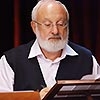The Commandments And The Laws
 Question: In the Torah the commandments and the judgments are described. What is the difference between them?
Question: In the Torah the commandments and the judgments are described. What is the difference between them?
Answer: The laws (Mishpatim) come from the side of the restrictions, and the commandments come from the side of the desire and readiness to carry them out. But in principle both of them talk about one thing: in what way a man needs to become similar to the Creator.
We are not talking about the level of this world. In the Torah, all the laws and commandments are discerned in relation to our ego and how to change it to something that is opposite, resembling the Creator, the property of complete bestowal and love, connection with everyone, where within this connection a huge property of bestowal is discovered, the force of creation called the Creator.
In the revelation of this force there are Taryag (613) egoistic attributes, desires. This is how they are called, “Taryag uncorrected desires.” We need to correct them from the egoistic intention for reception for myself, pleasure for myself, even causing damage to others (this is how we feel self-benefit), for use in order to bestow, meaning, for the benefit of others, and through this, to connect, to adhere, and to resemble the Creator.
There are limits in these actions when I rise above the ego (above my desire to receive) and stop working with it. Afterwards, I change it into a form that I can execute, above it, acts for the sake of bestowal. And afterwards, I myself add this ego to my intention for the sake of bestowal and act together with it for the sake of others, for bestowal.
For example, the thief stops stealing. This is the first commandment. The second commandment is that he gives all his stealing abilities to the benefit of man.
For example, like in the O.Henry story where the thief opens the safe in which a child had locked himself inside.
In this way, there are all the phases: restriction, rising above the ego, and transforming it into the act of bestowal. First is the restriction; I don’t steal. Second, rising above the ego: what isn’t done, that some egoistic reward that isn’t offered to us, which in any case we won’t use and renew actions that cause damage to others. Third, I use the speed of the response, the ability and possibility, to bestow and to give, in a way that is directed only to love.
Thus, the commandments and laws are divided. But in their expression are the restrictions of the right and left lines and the middle line in relation to you, society, and the Creator, with many kinds of subtleties.
[111526]
From the KabTV’s “The Secrets of the Eternal Book” 3/11/13
Related Material:
Be Your Own Prosecutor and Judge
To Do Or Not To Do?
Kabbalists On The Torah And Commandments, Part 4







Discussion | Share Feedback | Ask a question